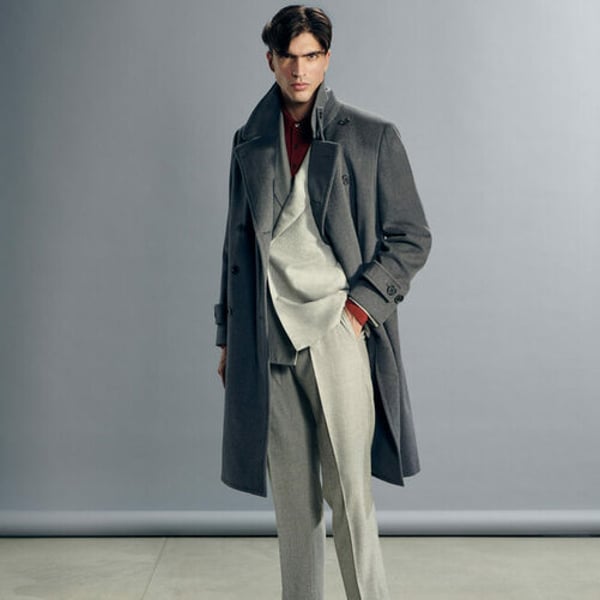
Caruso’s playful elegance on show at Pitti Uomo
Translated by
Nicola Mira
Published
Jan 12, 2024
Marco Angeloni, president and CEO of Caruso, has charted for FashionNetwork.com the journey that led the bijou Italian menswear house founded by Raffaele Caruso – a Neapolitan tailor who moved to Milan 60 years ago, setting up an atelier that initially catered to private customers and later to some of France’s leading labels – to become Italy’s largest tailoring company, employing 450 people.

In the 2000s, Angeloni’s father, an experienced executive with a lengthy career at luxury menswear label Brioni, understood Caruso’s potential and invested in the company, whose control had in the meantime been handed over to Raffaele’s children. Caruso was then acquired by Chinese fashion group Fosun, which gave free rein to the label’s executives, and was essential in relaunching the Caruso brand, boosting its third-party business, and helping it deal with the formal wear segment’s crisis.
Unlike other labels, which changed their strategy to follow the market, Caruso opted to stick to its guns, simply refreshing its formal wear – still the label’s core business, notably the hand-made jackets – with a contemporary touch. “[Customers] love to wear our garments for their lightness and softness, their impeccable cuts and top-notch fabrics, both by household names like Loro Piana, Zegna and Vitale Barberis, and more niche producers, including a few British ones. Our clothes can be justifiably worn with a measure of pride,” said Angeloni.

Caruso’s strategy has proved successful. Angeloni told FashionNetwork.com that revenue grew by 30% in 2023, reaching €40 million. Italy, where Caruso is distributed via 80 hand-picked addresses, remains the main market, accounting for 25% of revenue. The label is doing extremely well in Northern Europe, it is growing significantly in France, and “is highly appreciated in Japan, where Caruso jackets are often matched with items by other fashion labels, for a vibrant, elegant look,” said Angeloni. Caruso is currently available at 150 high-profile premium multibrand retailers and concept stores worldwide. Jackets and suits account for 70% of the business, but knitwear is also doing well. Caruso overcoats are uniquely woven with a fabric that keeps its shape and allows the garments to breathe, making them both warm and lightweight.
Angeloni said he is very keen to attract young talents interested in manufacturing jobs to the label’s Soragna factory, a must for a company whose foundational value is craftsmanship. Caruso has set up a specific staff training programme and, thanks to new benefits policies and new contractual terms that include results-based incentives, it is gaining a solid reputation as an attractive employer for the younger generations.

Angeloni is also thinking about opening a Caruso store in Milan, a return to the label’s roots, and is happy about the results achieved with the recently launched e-shop. “We aren’t thinking about a women’s line,” he said, even though Caruso does sell some womenswear, “because consistency has always paid dividends for us, and we feel we must remain anchored to our vocation for menswear,” he added.
Caruso is exhibiting at Pitti, “an event to which we have a profound connection, because it has always stood by our side, even in the most troubled times,” showcasing its new collection. Creative Director Max Kibardin, initially a backstage presence and now more in the limelight, has explored the many nuances of tailoring in the Fall/Winter 2024-25 collection, designing smart, sophisticated looks for men keen to embrace a century-old sartorial heritage. His looks for Caruso exude a sense of power and confidence, without being excessively austere. The mood is carefree and relaxed, in-keeping the label’s byword, ‘Playful Elegance’.
Copyright © 2024 FashionNetwork.com All rights reserved.


